Datasheet
Year, pagecount:2014, 3 page(s)
Language:English
Downloads:2
Uploaded:February 25, 2019
Size:1 MB
Institution:
-
Comments:
Attachment:-
Download in PDF:Please log in!
Comments
No comments yet. You can be the first!Most popular documents in this category
Content extract
Source: http://www.doksinet RIGS RIGS Right: Mirage Systems created a bespoke rig for BASE legend Jeb Corliss THE COOLEST RIG YOU’LL NEVER JUMP T here’s only one of them. Just one It may have its own ad campaign, peach placement in the footage from several internationallybroadcast wingsuit events and the near-inarguable status as “the most advanced hybrid rig in existence” – but it’s pretty lonely at the top. It is the Mirage Systems W-Series, and isn’t a “series” at all; as of publication, it’s just one single rig, and it sits on the back of the man who has been dreaming it into existence for almost two decades. The W-Series is not the first rig in the world that puts a BASE canopy in a container scaled – and optimised – for wingsuit flight, but there’s a big difference: it is legal to jump from an airplane. That difference makes the W-Series a big deal for all kinds of reasons, including the potential to open up thousands of heretofore-unjumped lines in
the world to wingsuit BASE jumping. And, when it gets some brothers and sisters, it could change the game in a big way. You can’t tell the story of the W-Series without telling the story of its creator, Jeb Corliss. He hardly needs introduction – after all, even the most passing interest in BASE jumping will 64 I have done the job. Over the years, he has been the subject of profiles published in The New York Times, Outside, Popular Mechanics, Smithsonian Air & Space, Men’s Journal and Rolling Stone. He has been featured on worldwide television, and was memorably cast as the original host of The Discovery Channel’s Stunt Junkies. “This rig has a very long story, because it starts at the beginning of my jumping. and I’ve been jumping for a long time,” he laughs. Corliss started skydiving at the age of 18, and began looking around for a W-Seriesstyle rig before he was even 20. “My original dream,” he remembers, “was to find a rig I could put a BASE canopy in, so
I could get current on it in the skydiving environment. If I do 500 skydives on something, and I take it into an environment when I’m landing in boulders, around trees, or in generally bad conditions, I’m more likely to succeed in that landing. So when I started, I searched for a rig that fit those perimeters. But it wasn’t available” Even five years ago, the W-Series would have been a pipe dream: the fabric technology simply didn’t support it. If you wanted to put a student out to practice PHOTOGR A PH Y D O V IL E S L AV IN S K A I T E & JE F F NE BE L KOP F I 65 Source: http://www.doksinet RIGS RIGS ‘I NEEDED A RIG THAT WAS AS SAFE IN THE BASE ENVIRONMENT AS A NATIVE BASE RIG – BUT ONE WITH TSO APPROVAL. IT DIDN’T EXIST’ based Parachute Labs in the 1990s. The rig is still available – but it is prohibitively awkward. The reserve parachute is carried in a large bellymount container, which prevents efficient wingsuit flight. The W-Series, however, takes
advantage of the past years’ exponential leaps and bounds in materials technology. Ultra-light fabric facilitates a dual-parachute container system that is sized like a 149/150 skydiving combo – but fits a much larger BASE canopy into the packing tray. The jumper still has a lot of material on their back – about 300 square feet – but the configuration skydiving their BASE canopy, you would have to have them pack it into a student rig. Unavoidably, it was a monstrosity and felt like a bag of bricks: a 200sq ft reserve leaning heavily on a pack tray constructed for a 260 sq ft main canopy. But why the ridiculously clunky gear, even for athletes sufficiently advanced to be starting their BASE jumping careers? It comes down to three letters: TSO. This, as all skydivers are keenly aware, is the three-letter acronym that governs a skydiver’s life in the sky. The acronym stands for Technical Standard Orders: a list of FAA rules that regulate everything approved to fly over United
States airspace, from airplanes to fabric airfoils (like ram-air parachutes). TSO regulations state that only FAA-approved skydiving rigs, with reserves repacked and sealed by FAA-approved technicians (“riggers”), 66 I are ever allowed to leave an aircraft (intentionally). Some exceptions are made for foreign skydivers, but the FAA is clear on the allowable construction: “Only single-harness, dual parachute systems” may see use in US skies. As Corliss, and others, discovered over the course of many years, there are no exceptions made – even for big movies, when the skydiver is deploying “in the basement” to give the cameras a crazy shot nestled in the teeth of a city skyline. The American organisation isn’t the only aviation administration that hard-lines the requirement: it is the worldwide standard, with precious few exceptions. Notably, the W-Series wasn’t the first successful attempt to get a BASE rig in the American airspace. The first TSO’d BASE rig was
designed by the team efforts of Ulster County Containers and Canopies and Florida- Pictured: The W-Series can accommodate a wingsuit, a FLiK 266 and a reserve parachute is significantly different. Unlike a BASE container, the W-Series uses a single-pin closing system. Like a BASE container, the main canopy is freepacked into the tray without a bag, which opens much like a BASE system (cornerless, with nothing to “grab” the fabric as it extracts). The most obvious difference: this rig ain’t for students. The only way to make the configuration work, even with the use of ultra-light fabric for both canopies – is to drastically reduce the size of the reserve parachute. Developed and designed for expert pilots, the W-Series uses a springloaded Performance Designs Optimum 106, which is nobody’s idea of a student-appropriate canopy. But that’s not why this rig was created. Jeb Corliss, after all, is a showman. He performs aerial stunts for a long list of television and film
productions. “Over the past couple of years, I started running into a really serious problem,” he says. “I was getting hired for a lot of big projects where we needed to leave aircraft in order to get the shot, but the deployment had to be very low. For safety, I very much needed to use a BASE rig, but aircraft were involved, so I couldn’t. Those regulations – which were established by the FAA in order to save lives – became a serious mortal danger. “Getting permission [to use a BASE rig from an aircraft exit] is literally impossible,” Corliss shakes his head. “To do my job, I needed a rig that was as safe in the BASE environment as a native BASE rig – but one with TSO approval. It didn’t exist. I had to make it” The other problem that Corliss was looking to solve wasn’t as straightforward as a way around an entry in a book of regulations. It was safety-related: the elusive delight of a reliable wingsuit deployment in a world where wingsuits have suddenly
swollen to twice their original size. Corliss has been flying wingsuits for 16 years – since 1998 – and noticed a very sudden, very big problem. “I never had a problem with line twists and cutaways. Literally, in thousands of wingsuit flights, I had zero cutaways. But then wingsuits changed – they got much, much bigger. Deployments started becoming much more crucial.” MIR AGE SYSTEMS W-SERIES: THE SPECIFICS The container closes like a normal Mirage, however the corners are dynamic; held together using a magnet system. The container includes built-in riser ramps for consistent riser deployment without sacrificing any of the superior riser protection found on all Mirage containers. The BOC is closed with magnets, ensuring security while providing an easy, on heading deployment. Source: http://www.doksinet RIGS Line twists aside, the pivotal moment came when Corliss was hired for a project shot in Japan. The sequence involved a wingsuit flight over Mt Fuji. It seemed
straightforward from the preliminary briefing; however, when Corliss arrived to the set, there was a nasty surprise waiting for him. “I didn’t realise how tall Mt Fuji actually is,” he remembers. “The helicopter I had to exit from could only get to 14,000 feet, but Fuji is 12,000 feet tall. So the second I exit, I’m at skydiving country and founded by Dawn English (the first woman to win a 4-way medal at the USPA Nationals). “I’ve been flying a Mirage forever,” he says. “It’s a comfortable rig – a beautiful rig. It was a big ask, but I was crossing my fingers that they could help.” After a promising initial call, English invited him to fly out to Florida to discuss his needs face-to-face. “Dawn is one of the smartest people I know,” Corliss says. “This was obviously a specialty rig, for a very specific THE MARKET IS SMALL: TOP-LEVEL BASE JUMPERS PERFORMING DEMANDING FLIGHTS, WHO CAN SAFELY LAND A VERY SMALL RESERVE pull altitude for the skydiving rig
I’m required to use. Obviously, I knew that I needed a BASE rig, but they wouldn’t let me use it. I ended up doing the flight, but it shook me up,” he grimaces. “I swore I wouldn’t be doing that again. So I started looking around at gear manufacturers to help create a solution.” Unsurprisingly, Corliss went to his sponsor first: Mirage Systems. Located in the heart of DeLand, Florida’s 68 I person doing a very specific thing. The market is unbelievably small: top-level BASE jumpers performing extremely demanding flights, who can safely land a very small reserve. The thing is, it’s technically not for BASE jumping. What it’s for is proxy flying wingsuits from aircraft.” Corliss’s wish list didn’t include acrobatic BASE jumps or low exit points. His needs specifically called Above: The potential to jump from aircraft opens a new world of proximity flights for a rig that is meant to be deployed with forward movement – specifically, subterminal-to-terminal
wingsuiting and tracking. The rig needed to be comfortable, designed to accommodate a wingsuit, capacious enough to fit his FLiK 266 and inclusive of the all-important reserve parachute, however small. The meeting went well. “She built me a dream rig. She literally did everything I asked for, and put it in a beautiful package. The magic is that it can fit an ultralight Apex FLiK 266 in a container that is the size of a Spectre 170,” he continues. “It’s the easiest rig I’ve ever packed in my life. I can travel with a single rig and do everything I want to do.” The rig is not without its faults. BASE jumpers point out that it is inappropriate for traditional BASE jumping, as it is prohibitively heavy and cumbersome for long hikes. The spring-loaded reserve is essentially useless in the BASE environment. The deployment style is impractical for non-tracking, non-wingsuit jumps. Also: it is very, very expensive. Corliss shrugs it off “[Dawn] is more about the concept – about
being innovative – than about selling a bunch of stuff,” he smiles, “She sees the future. She’s proactive” Which begs the question, of course: what future is she looking into? According to Corliss, it’s certainly not the future with which most BASE careers will converge. It is a bespoke future for the top handful of jumpers in the sport. A superlative future for the hyper-elite. “The potential to jump from aircraft opens a new world of proximity flights that simply can’t be accessed from the land,” he muses. “It opens up the United States. Wide Wingsuit racing is growing, and with this rig, we can host competitions here. That’s huge “You’re going to have to be a known person to purchase it,” he continues. “But it’s a work of art, as far as I’m concerned.” He smiles “I’ve never felt that about a rig, ever.”
the world to wingsuit BASE jumping. And, when it gets some brothers and sisters, it could change the game in a big way. You can’t tell the story of the W-Series without telling the story of its creator, Jeb Corliss. He hardly needs introduction – after all, even the most passing interest in BASE jumping will 64 I have done the job. Over the years, he has been the subject of profiles published in The New York Times, Outside, Popular Mechanics, Smithsonian Air & Space, Men’s Journal and Rolling Stone. He has been featured on worldwide television, and was memorably cast as the original host of The Discovery Channel’s Stunt Junkies. “This rig has a very long story, because it starts at the beginning of my jumping. and I’ve been jumping for a long time,” he laughs. Corliss started skydiving at the age of 18, and began looking around for a W-Seriesstyle rig before he was even 20. “My original dream,” he remembers, “was to find a rig I could put a BASE canopy in, so
I could get current on it in the skydiving environment. If I do 500 skydives on something, and I take it into an environment when I’m landing in boulders, around trees, or in generally bad conditions, I’m more likely to succeed in that landing. So when I started, I searched for a rig that fit those perimeters. But it wasn’t available” Even five years ago, the W-Series would have been a pipe dream: the fabric technology simply didn’t support it. If you wanted to put a student out to practice PHOTOGR A PH Y D O V IL E S L AV IN S K A I T E & JE F F NE BE L KOP F I 65 Source: http://www.doksinet RIGS RIGS ‘I NEEDED A RIG THAT WAS AS SAFE IN THE BASE ENVIRONMENT AS A NATIVE BASE RIG – BUT ONE WITH TSO APPROVAL. IT DIDN’T EXIST’ based Parachute Labs in the 1990s. The rig is still available – but it is prohibitively awkward. The reserve parachute is carried in a large bellymount container, which prevents efficient wingsuit flight. The W-Series, however, takes
advantage of the past years’ exponential leaps and bounds in materials technology. Ultra-light fabric facilitates a dual-parachute container system that is sized like a 149/150 skydiving combo – but fits a much larger BASE canopy into the packing tray. The jumper still has a lot of material on their back – about 300 square feet – but the configuration skydiving their BASE canopy, you would have to have them pack it into a student rig. Unavoidably, it was a monstrosity and felt like a bag of bricks: a 200sq ft reserve leaning heavily on a pack tray constructed for a 260 sq ft main canopy. But why the ridiculously clunky gear, even for athletes sufficiently advanced to be starting their BASE jumping careers? It comes down to three letters: TSO. This, as all skydivers are keenly aware, is the three-letter acronym that governs a skydiver’s life in the sky. The acronym stands for Technical Standard Orders: a list of FAA rules that regulate everything approved to fly over United
States airspace, from airplanes to fabric airfoils (like ram-air parachutes). TSO regulations state that only FAA-approved skydiving rigs, with reserves repacked and sealed by FAA-approved technicians (“riggers”), 66 I are ever allowed to leave an aircraft (intentionally). Some exceptions are made for foreign skydivers, but the FAA is clear on the allowable construction: “Only single-harness, dual parachute systems” may see use in US skies. As Corliss, and others, discovered over the course of many years, there are no exceptions made – even for big movies, when the skydiver is deploying “in the basement” to give the cameras a crazy shot nestled in the teeth of a city skyline. The American organisation isn’t the only aviation administration that hard-lines the requirement: it is the worldwide standard, with precious few exceptions. Notably, the W-Series wasn’t the first successful attempt to get a BASE rig in the American airspace. The first TSO’d BASE rig was
designed by the team efforts of Ulster County Containers and Canopies and Florida- Pictured: The W-Series can accommodate a wingsuit, a FLiK 266 and a reserve parachute is significantly different. Unlike a BASE container, the W-Series uses a single-pin closing system. Like a BASE container, the main canopy is freepacked into the tray without a bag, which opens much like a BASE system (cornerless, with nothing to “grab” the fabric as it extracts). The most obvious difference: this rig ain’t for students. The only way to make the configuration work, even with the use of ultra-light fabric for both canopies – is to drastically reduce the size of the reserve parachute. Developed and designed for expert pilots, the W-Series uses a springloaded Performance Designs Optimum 106, which is nobody’s idea of a student-appropriate canopy. But that’s not why this rig was created. Jeb Corliss, after all, is a showman. He performs aerial stunts for a long list of television and film
productions. “Over the past couple of years, I started running into a really serious problem,” he says. “I was getting hired for a lot of big projects where we needed to leave aircraft in order to get the shot, but the deployment had to be very low. For safety, I very much needed to use a BASE rig, but aircraft were involved, so I couldn’t. Those regulations – which were established by the FAA in order to save lives – became a serious mortal danger. “Getting permission [to use a BASE rig from an aircraft exit] is literally impossible,” Corliss shakes his head. “To do my job, I needed a rig that was as safe in the BASE environment as a native BASE rig – but one with TSO approval. It didn’t exist. I had to make it” The other problem that Corliss was looking to solve wasn’t as straightforward as a way around an entry in a book of regulations. It was safety-related: the elusive delight of a reliable wingsuit deployment in a world where wingsuits have suddenly
swollen to twice their original size. Corliss has been flying wingsuits for 16 years – since 1998 – and noticed a very sudden, very big problem. “I never had a problem with line twists and cutaways. Literally, in thousands of wingsuit flights, I had zero cutaways. But then wingsuits changed – they got much, much bigger. Deployments started becoming much more crucial.” MIR AGE SYSTEMS W-SERIES: THE SPECIFICS The container closes like a normal Mirage, however the corners are dynamic; held together using a magnet system. The container includes built-in riser ramps for consistent riser deployment without sacrificing any of the superior riser protection found on all Mirage containers. The BOC is closed with magnets, ensuring security while providing an easy, on heading deployment. Source: http://www.doksinet RIGS Line twists aside, the pivotal moment came when Corliss was hired for a project shot in Japan. The sequence involved a wingsuit flight over Mt Fuji. It seemed
straightforward from the preliminary briefing; however, when Corliss arrived to the set, there was a nasty surprise waiting for him. “I didn’t realise how tall Mt Fuji actually is,” he remembers. “The helicopter I had to exit from could only get to 14,000 feet, but Fuji is 12,000 feet tall. So the second I exit, I’m at skydiving country and founded by Dawn English (the first woman to win a 4-way medal at the USPA Nationals). “I’ve been flying a Mirage forever,” he says. “It’s a comfortable rig – a beautiful rig. It was a big ask, but I was crossing my fingers that they could help.” After a promising initial call, English invited him to fly out to Florida to discuss his needs face-to-face. “Dawn is one of the smartest people I know,” Corliss says. “This was obviously a specialty rig, for a very specific THE MARKET IS SMALL: TOP-LEVEL BASE JUMPERS PERFORMING DEMANDING FLIGHTS, WHO CAN SAFELY LAND A VERY SMALL RESERVE pull altitude for the skydiving rig
I’m required to use. Obviously, I knew that I needed a BASE rig, but they wouldn’t let me use it. I ended up doing the flight, but it shook me up,” he grimaces. “I swore I wouldn’t be doing that again. So I started looking around at gear manufacturers to help create a solution.” Unsurprisingly, Corliss went to his sponsor first: Mirage Systems. Located in the heart of DeLand, Florida’s 68 I person doing a very specific thing. The market is unbelievably small: top-level BASE jumpers performing extremely demanding flights, who can safely land a very small reserve. The thing is, it’s technically not for BASE jumping. What it’s for is proxy flying wingsuits from aircraft.” Corliss’s wish list didn’t include acrobatic BASE jumps or low exit points. His needs specifically called Above: The potential to jump from aircraft opens a new world of proximity flights for a rig that is meant to be deployed with forward movement – specifically, subterminal-to-terminal
wingsuiting and tracking. The rig needed to be comfortable, designed to accommodate a wingsuit, capacious enough to fit his FLiK 266 and inclusive of the all-important reserve parachute, however small. The meeting went well. “She built me a dream rig. She literally did everything I asked for, and put it in a beautiful package. The magic is that it can fit an ultralight Apex FLiK 266 in a container that is the size of a Spectre 170,” he continues. “It’s the easiest rig I’ve ever packed in my life. I can travel with a single rig and do everything I want to do.” The rig is not without its faults. BASE jumpers point out that it is inappropriate for traditional BASE jumping, as it is prohibitively heavy and cumbersome for long hikes. The spring-loaded reserve is essentially useless in the BASE environment. The deployment style is impractical for non-tracking, non-wingsuit jumps. Also: it is very, very expensive. Corliss shrugs it off “[Dawn] is more about the concept – about
being innovative – than about selling a bunch of stuff,” he smiles, “She sees the future. She’s proactive” Which begs the question, of course: what future is she looking into? According to Corliss, it’s certainly not the future with which most BASE careers will converge. It is a bespoke future for the top handful of jumpers in the sport. A superlative future for the hyper-elite. “The potential to jump from aircraft opens a new world of proximity flights that simply can’t be accessed from the land,” he muses. “It opens up the United States. Wide Wingsuit racing is growing, and with this rig, we can host competitions here. That’s huge “You’re going to have to be a known person to purchase it,” he continues. “But it’s a work of art, as far as I’m concerned.” He smiles “I’ve never felt that about a rig, ever.”
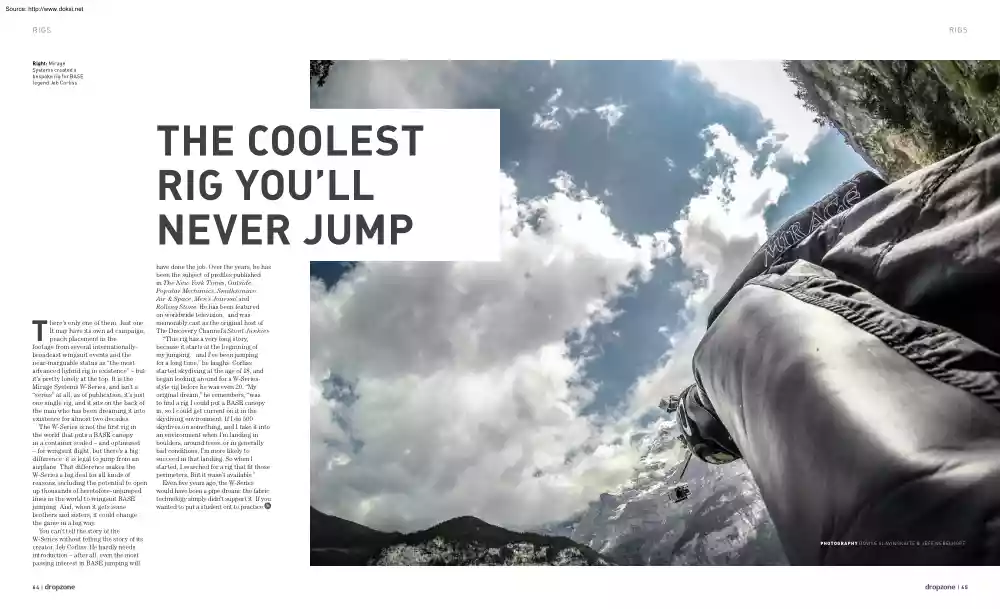
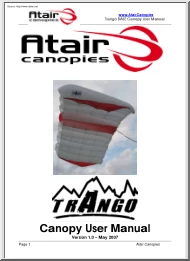
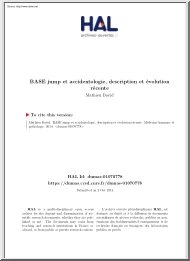
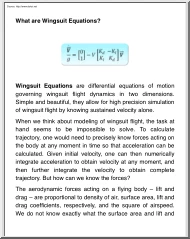
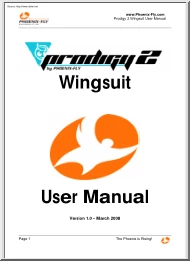
 When reading, most of us just let a story wash over us, getting lost in the world of the book rather than paying attention to the individual elements of the plot or writing. However, in English class, our teachers ask us to look at the mechanics of the writing.
When reading, most of us just let a story wash over us, getting lost in the world of the book rather than paying attention to the individual elements of the plot or writing. However, in English class, our teachers ask us to look at the mechanics of the writing.